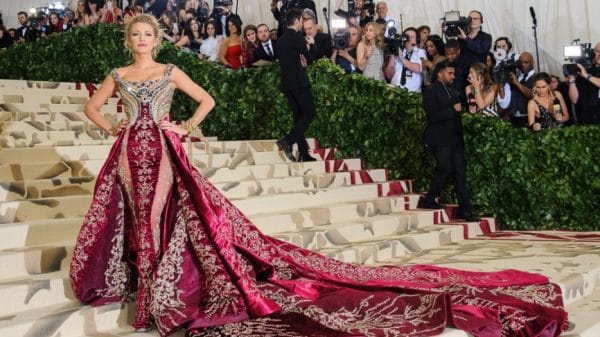You and your partner are as committed as Blake Lively and Ryan Reynolds. You buy each other flowers and eat tubs of ice cream with the same spoon – all that romantic jazz. Still, you’re suspicious that your Ryan Reynolds is going to pull an Adam Levine. So what’s causing the young generation’s inordinate trust issues?
As always, it’s the internet
Social media has been pushing a new, toxic agenda onto real-life relationships. TikTok’s users have made a collective decision: if one relationship has gone downhill, the other 4.9 billion of us on the internet are going down with it. You may have seen videos like this on your ‘For You’ page.
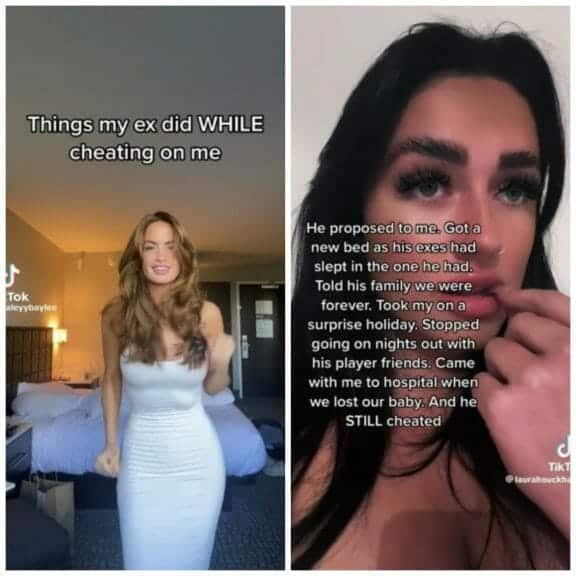
These TikToks will recount romantic chronicles of love letters, honeymoons, and picnics – all to end in betrayal. If you’re a doomscroller, you have no chance against this romantic nihilism. It will make you feel like every relationship, no matter how healthy, is doomed for heartbreak. Just a glance at the comments will show you how this is distorting people’s perception of romance:
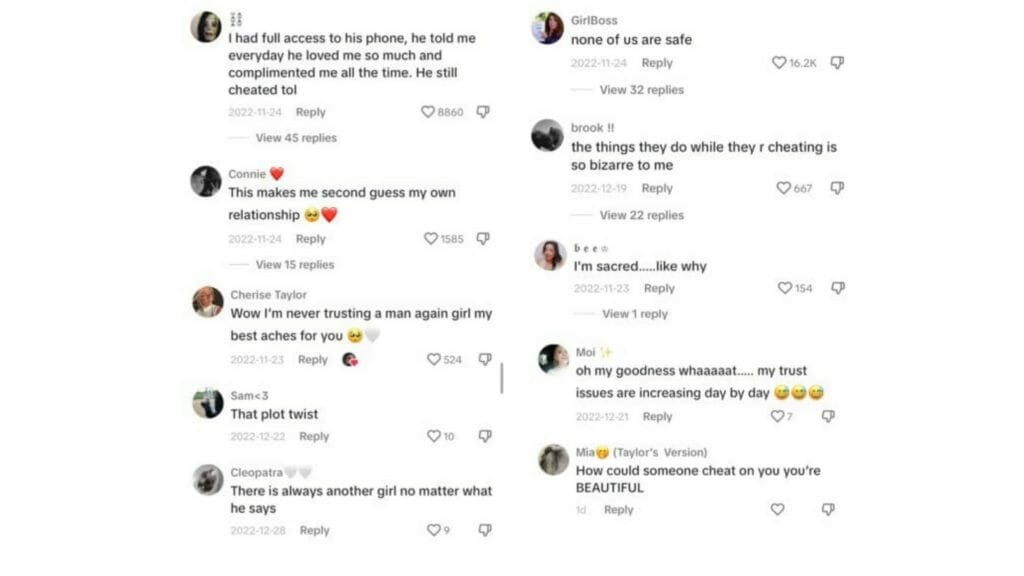
Clearly, it feels like we’re having an epidemic of two-timers. But how much of this is real? What happens when we let the relationships we see online influence our own?
The problem with the ‘parasocial’
When we put too much stock into the relationships we see online, we effectively form a parasocial relationship with them. A parasocial relationship consists of two parties and is always one-sided. One party becomes emotionally invested in the other party. This is a common dynamic between celebrities and their die-hard fans.
The problem is that the other party doesn’t know you exist. Despite their ignorance of your entire existence, you’re still attached to them and influenced by them. So, if you’re someone who clings onto the chronicles of Justin and Hailey Bieber’s tumultuous relationship – or if you’re someone who thinks romance will truly be dead if Tom Holland and Zendaya ever break up – you’re basically already in some kind of parasocial, digital threesome.
Here’s the issue – you’re not actually in the relationship.
Tom and Zendaya may seem all roses and butterflies. But everything we know about any celebrity couple only comes from snippets of information on social media. It’s the same with TikTok relationships. We’re basing our judgment of romantic relationships on a video that might not even be real – yet our parasocial attachment to the relationships we see online leads us to take TikTok as gospel. Of course, people are allowed to share their heartbreaks on the internet for others to sympathize with. Often, though, social media creators will take advantage of how easy it is to influence people using a single viral video. Have a look at these examples.
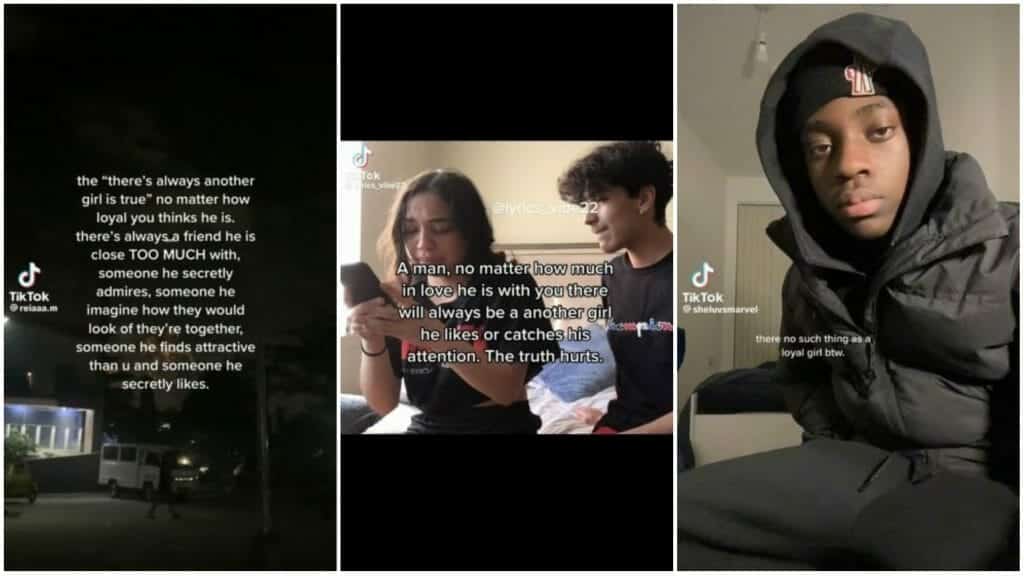
Unlike the previous TikToks we’ve seen, these TikToks are not expressing personal experiences. Instead, they are making broad, baseless generalizations about unfaithfulness. It’s no longer ‘Things My Ex Did’ or ‘How I Got Cheated on’. The above videos have a complete absence of ‘my’ or ‘I’. This means viewers are not given the option to take what’s being said as a personal situation. Instead, the accusatory, condemning statements are simply presented as facts. Compared to the previous TikToks, it’s a far more extreme way of persuading viewers that every relationship is doomed. Any viewer could be convinced that these TikToks are stating a social norm, no matter how absurd they really are.
Some of these TikToks have millions of likes. It indicates that these harmful generalizations are not only reaching mass audiences, but are also being universally accepted. Even more worryingly, the TikTok algorithm is quick to reel in similar content before you’ve even pressed the like button. So, once you’ve given just one of these toxic videos a tentative like, you’ve already set yourself on the path for some seriously destructive, parasocial brainwashing.
On the bright side, one sector of the internet isn’t having it.
Most of us TikTokers are pretty far down this self-destructive rabbit hole. Some Reddit users, though, have reached an enlightenment. These Redditors have voiced their disillusionment towards TikTok relationship culture – and they aren’t happy with how the app has forced us all into a romantic pandemonium.
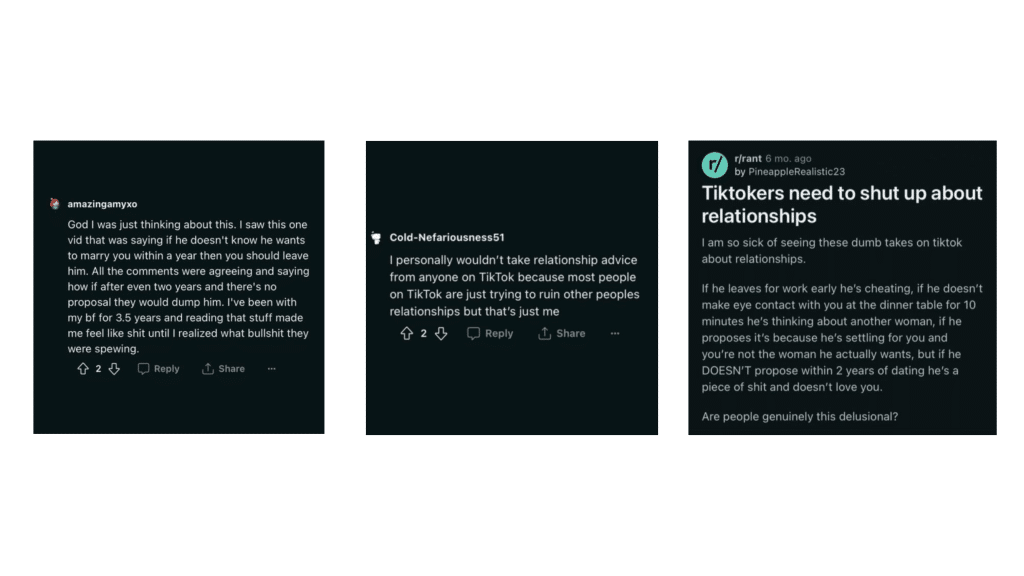
Some people, at least, are seeing the light at the end of the tunnel. There’s been a realization that TikTok’s so-called relationship ‘advice’ is intended to damage your relationship rather than mend it. This realization is the first step in breaking away from the parasocial relationships that avid TikTok users religiously absorb.
But the problem spreads – to podcasts
While Redditors may be disenchanted, TikTok is steadily infecting other platforms with its romantic generalizations. As TikTok’s copycat, Instagram Reels was bound to succumb to the same swarm of toxic relationship videos. More alarmingly, though, dozens of on-the-rise podcasts have seized the opportunity to spew further nonsense. The supposed adulterous inevitability of heteronormative relationships is a current hot topic.
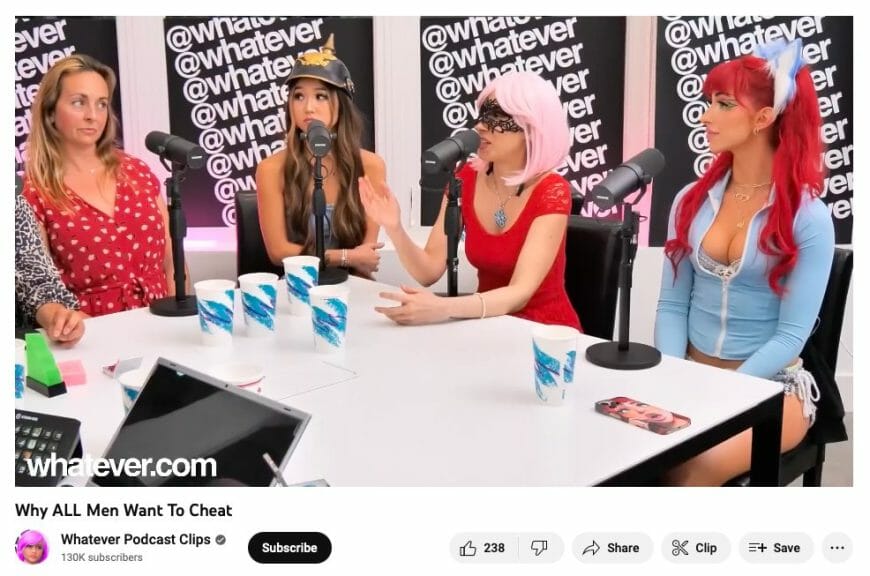
So here’s the combination: floods of TikToks telling you that your relationship is destined for infidelity and unqualified microcelebs taking to YouTube to chant their uncorroborated podcast doctrines. The product? Hysteria.
From something seemingly microscopic – like a TikToker claiming that men only buy you flowers when they’re cheating – erupts a social media gender war. Do men really cheat more than women, or are women better at hiding it? And if she takes more than three hours to text back, does that really mean she’s ‘for the streets’? These are the kind of nonsensical questions that podcasts will pose, diving into their audience’s parasocial anxieties to rake up views and relationship paranoia. With a few confident voices and oversized microphones, it’s easy to drown the entire internet in trust issues, swerving the only important question: how much of this is actually real?
The Takeaway
In the end, videos and comments from strangers on the internet are just that – strangers saying strange things that have nothing to do with your life and your relationships. The aim of these TikToks is to make very rare situations feel like personal threats. It’s one of the endless, clever ways social media worms its way into our real lives, causing mistrust with no basis other than ‘someone on the internet said so’. There’s no way to tell what’s real, what’s exaggerated, and what’s just been pulled off a twelve-year-old’s Wattpad page. The crucial thing is not to compare your real relationships to parasocial ones.









